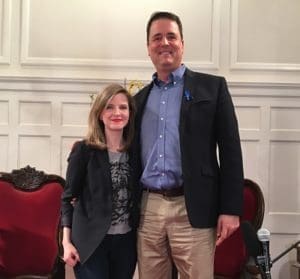 We were honored to host a live Q&A and book signing with New York Times bestselling-author Tara Westover on March 29, 2018 at the First Unitarian Church in Salt Lake City.
We were honored to host a live Q&A and book signing with New York Times bestselling-author Tara Westover on March 29, 2018 at the First Unitarian Church in Salt Lake City.
Tara is the author of the book Educated. Born in Idaho to a father opposed to public education, she never attended school. She spent her days working in her father’s junkyard or stewing herbs for her mother, a self-taught herbalist and midwife. She was seventeen the first time she set foot in a classroom. After that first encounter with education, she pursued learning for a decade, graduating magna cum laude from Brigham Young University in 2008 and subsequently winning a Gates Cambridge Scholarship. She earned an MPhil from Trinity College, Cambridge in 2009, and in 2010 was a visiting fellow at Harvard University. She returned to Cambridge, where she was awarded a PhD in history in 2014.
If you missed our first interview with Tara, you may find it here.
Part 1




11 Responses
Just finished reading you book. You did a fine job telling a very difficult story. I worked 20+ years with child victims of abuse/neglect, even more years working with adults suffering from mental illness. I also grew up with a mentally ill parent. Your book more than any other I have read, gives insight into the internal experience and anguish of trying to keep the soul together in the mist of physical suffering and emotional degradation. Like so many victims, sworn to secrecy by loyalty, brain washing, and shame. It must have hurt so much to have your parents take credit for your accomplishments. You turned out okay, better than okay, therefore how they raised you was okay; even better than okay. It’s the old paradox of reality vs the appearance of reality. One lesson I hope that others facing similar experiences will take from your book is this; a person can survive hell and still have a life worth living, even if the perpetrators of that suffering never taking responsibility for what they did, never giving any credit to you for what you did. I think you survived because you created an internal parent. You raised yourself.
That’s so true. Created ‘an internal parent’. Love your comment. Such insight.
Some of us don’t have a childhood because we were too busy parenting our parents. As I raised two children, I was still parenting them from as far away as I could live from them.
I really appreciated this interview and Q&A session. It tied some loose ends I had from reading the book. In my life I have known perhaps a dozen people who had come from situations much like the one from whence Tara came. Many of those had joined the armed forces and found new homes in other places. I feel that Tara’s is the voice of a hundred thousand, perhaps, a million, people — and that’s just from the Intermountain region and High Plains.
Recognizing the right question to ask is definitely far more imperative as compared to having a complete reply. First-class questions dispute your thinking. Research studies are very unambiguous that we nurture people who take note of us. Our task and goals are absolutely centrally who we are and who we want to be. In the simplest sense, power questions are our tool for assisting to see the factual reality around us as opposed to shadowy depictions of it. Ask elementary questions regarding the things that all others takes for certain. Everyone is merciful. They desire to have a great conversation with you. We do things for numerous distinctive objectives. Whenever you question somebody as to what fulfills them, it opens the door to exploring something that is definitely very special to that particular person. It could be a miraculous moment in time for others whenever you entice them to talk about their dreams together with you. There are instances when you don’t need to offer instructions.
I have a hard time believing her view that the kind or “selfless” things abusive people do are from a place of real love. Abusive people spread kindness throughout their interactions with you in order to keep you around so they can keep abusing you and feeding their narcissistic need to have power and control over you. If they are always mean and never kind, it makes it a lot easier for you to leave. If they confuse you with inconsistent behavior, they lead you to believe they love you when in reality it’s a manipulation tactic.
Marvelous to see and hear Tara. I like her ability not to prescribe, predict, confer onto others. Tara, you have such a gift of clear thinking, unimpeded by the need to persuade others. Refreshing in the age of fake-everything.
You articulated what I was feeling as I listened to this interview. I was trying to put it into words in my own mind, but then I read your comment, and it did it for me.
I loved your book Tara. Took courage to tell your story. Stay away from your parents and may I suggest you look to Christian’s for more answers. God bless
I have a connection to you Tara . We are related. Your father and my father spent time together . I am from Dayton . I have very fond memories of your grandmother. I can picture her sitting at the small oak table in her kitchen winking at me . I loved her.
I was so confounded, and confused by this tragic family dynamic due to mental illness
of Tara’s parents that I immediately re-read the book to make sure I was comprehending what
I was reading. Children are truth tellers for the most part and Tara had this wonderful gift of recall, a need to speak the truth while she had it fresh in her memory, and a desire to expose what a untreated bipolar parent can do to hold hostage the entire family. What a shame that this should happen to anyone, especially a brilliant young woman who deserved nothing but the best outcome for her life.